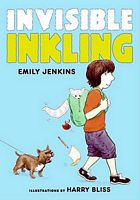 Today’s Pick: Half Brother by Kenneth Oppel
Today’s Pick: Half Brother by Kenneth OppelPublished by HarperCollins, 2010
Summary:
Thirteen-year-old Ben is getting a new baby brother—a chimpanzee. Ben’s parents are both behavioral scientists and they want to prove that animals can learn American Sign Language. They think that raising a chimp in their home, like one of the family, is the best way to do it. If that wasn't hard enough, Ben has to deal with moving to a new city and a new school. Although it takes a while for Ben to warm up to his chimp brother Zan, over time they build a strong bond. At the same time, his father's research project experiences some issues and the conflict grows between Ben and his father. Eventually, Ben has to choose between loyalty to his family or to his brother. This story takes place in the early 1970's in Canada.
My Take:
This well-written novel really makes you think about the relationship between animals and humans. I admired the way research and information about the study of chimps is so skillfully blended into the story. With strong characters, bits of humor and lots of tension, this book was hard to put down. It kept me thinking long after I finished it. This story will appeal to both boys and girls, especially animal-lovers. The story isn’t only about the animal-human relationship, it’s about friendships, family and the love that brings living beings together (or keeps them apart). A note for fans of Kenneth Oppel's other books - this one is quite different, but still a compelling read.Other Info:
This novel has been optioned for film.
Half Brother has won the Ontario Library Association's 2012 Red Maple Award. This reader's choice award is chosen by tens of thousands of grade 7 and 8 students across Ontario. This is Oppel's third win: Airborn and Skybreaker were previous recipients.
It has received several awards, including the 2011 Ruth and Sylvia Schwartz Book Award in the Middle Reader/Young Adult category, the Canadian Library Association Book of the Year Award and the Canadian Library Association Young Adult Book Award, and has been named as 2011 Best Book for Young Adults by the American Library Association.
Kenneth Oppel shares some of his thoughts about writing this novel on his blog in written form and in this clip as he accepts his awards.
Silverwing
Sunwing
Firewing
Darkwing
Airborn
Skybreaker
Starclimber
This Dark Endeavour (a new novel about the apprenticeship of Victor Frankenstein)
For more, go to Kenneth Oppel’s website.




